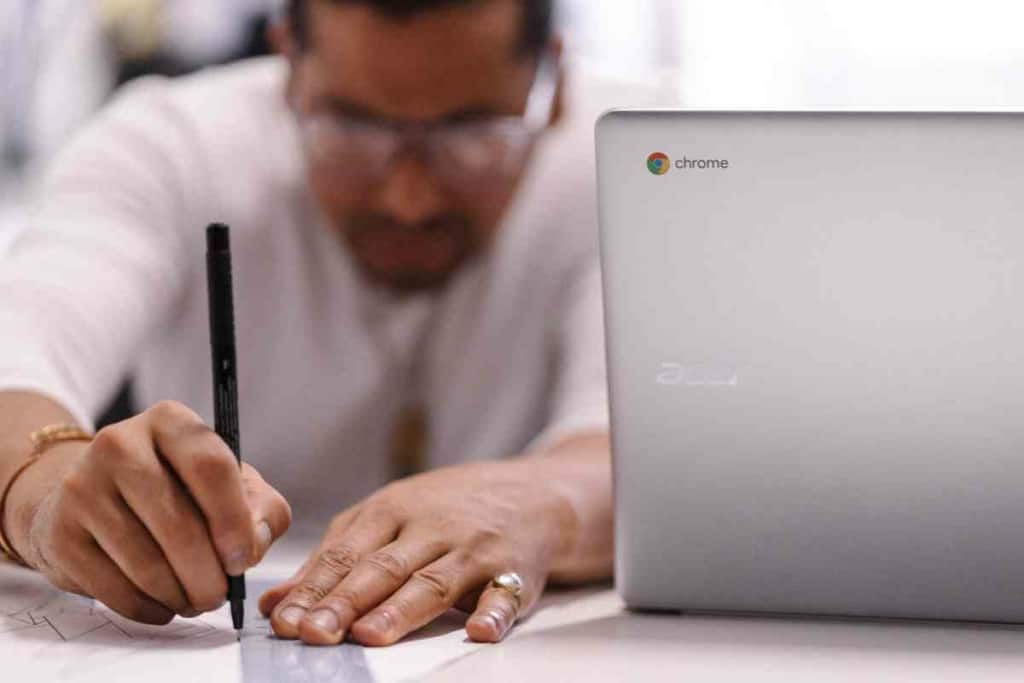Chromebook vs Laptop: Pros and Cons Compared
In the digital age, finding the perfect companion for your tech adventures can often feel like navigating a labyrinth. At the heart of this quest are two stalwarts: Chromebooks and laptops. Each brings its unique flair to the table, designed to cater to diverse needs, from work and education to the vast expanses of personal use.

Related Post! How Much Does It Cost To Replace A Chromebook Screen
How Do Chromebooks Compare To Laptops?
Chromebooks, lightweight and affordable, offer seamless web integration and automatic updates, prioritizing security. In contrast, laptops boast versatility and power, catering to diverse tasks like gaming and heavy-duty applications. While Chromebooks excel in web-centric tasks, laptops provide broader software compatibility and performance, catering to varied user needs and preferences.
In this guide, we’ll delve deep into the world of these devices, comparing their strengths and weaknesses to help you decide which one aligns with your digital life’s demands.
Overview

Chromebooks stand out as the sleek warriors of the web, championed by Google’s Chrome OS. These devices are the epitome of simplicity and efficiency, tailored for those who thrive online. With their affordable price tags, long battery life, and lightning-fast boot-up times, they beckon as the ideal choice for budget-conscious users and anyone who values quick access to the web. However, their Achilles’ heel lies in their reliance on an internet connection for optimal functionality, limited offline functionality, and a more confined selection of apps.
On the other hand, traditional laptops are the versatile powerhouses, running on robust operating systems like Windows and MacOS. Whether it’s for video editing, gaming, or programming, these devices are equipped to handle demanding tasks with aplomb. Their wide selection of apps and generous storage options make them a haven for users with hefty digital needs. Yet, this versatility comes at a cost, both literally and figuratively, as they tend to be more expensive and heavier, with longer boot-up times than their Chromebook counterparts.
So, how do you decide between the streamlined efficiency of a Chromebook and the versatile power of a laptop? Consider your primary activities. Are you a student or a professional whose work lives in the cloud, making the affordability and portability of a Chromebook appealing? Or do you require the robust performance and software compatibility of a traditional laptop for intensive tasks and entertainment?
When pondering hardware and performance, Chromebooks often feature specs that handle everyday tasks with ease, while laptops can be equipped with powerful graphics chips and processors like AMD Ryzen, making them suitable for more intensive applications. Connectivity is another critical factor; with multiple USB ports and options for external displays, laptops often offer more flexibility.
Yet, in the realm of security and updates, Chromebooks shine, offering a streamlined, cloud-based experience with automatic updates, reducing the hassle of manual maintenance. And when considering price and value for money, Chromebooks generally offer great deals for those who prioritize web-based applications, while laptops provide a broader range of features at various price points, from the budget-friendly Lenovo IdeaPad to the high-performance Asus models.
Deciding between a Chromebook and a laptop is ultimately a personal choice, reflecting your digital lifestyle. Whether you’re drafting documents on Google Drive, exploring new software, or streaming the latest series, your device should amplify your experiences, not hinder them. Remember, in this ever-evolving digital age, choosing a device is about finding the right tool that fits seamlessly into your life, letting you navigate the vast digital expanse with ease and confidence.
Related Post! Can You Make Money Getting Rid Of An Old Chromebook?
Operating Systems

Embarking on the quest for the perfect computing companion often leads us to a crossroads: the choice between a Chromebook and a traditional laptop. This pivotal decision hinges not just on the device itself but on the very soul of these machines: their operating systems. Each OS brings its own set of tools to the table, adorned with unique pros and cons. Let’s dive into the digital cosmos of Chrome OS, Windows, Mac OS, and Linux to discover which realm best suits your virtual voyages.
Chrome OS
Imagine a world where simplicity and speed reign supreme. Chrome OS is the embodiment of this vision, powering Chromebooks with an ethos of streamlined efficiency. Born from the Chrome web browser, this OS is a haven for those seeking a user-friendly interface, making it a beacon for beginners or minimalists. Its robust security features stand as a vigilant guard against the dark arts of viruses and malware, offering peace of mind in the ever-turbulent online seas. Yet, this simplicity comes with its boundaries, primarily its reliance on web-based applications and limited software availability, hinting at a horizon confined to the internet’s vast clouds.
Windows
Venturing into the realm of Windows, one finds a landscape teeming with versatility and customization. This OS is a chameleon, adapting to your needs, whether it’s for intricate software applications or tailoring your digital environment to your heart’s content. Windows laptops are the jack-of-all-trades, capable of supporting a broad spectrum of software for any task imaginable. However, this openness comes at a price, beckoning users to be ever vigilant against the specters of viruses and malware that lurk in the shadows.
Mac OS
In the lush valleys of Mac OS, stability and aesthetic harmony flourish. Apple’s signature OS offers a sanctuary of reliability, less prone to the caprices of crashes and errors. Its interface is a masterpiece of design, intuitive and sleek, catering to those who value elegance in their digital experience. However, this beauty is not without its limitations, as the garden walls of Mac OS may not embrace all the software one might wish to cultivate within.
Linux
Finally, the Linux OS beckons the adventurous spirit, a land of unparalleled flexibility and security. Its open-source nature invites customization, offering a plethora of distributions to suit any preference. For the tech-savvy explorer, Linux offers a realm where imagination is the only limit. Yet, this freedom demands a price in usability, posing challenges to those not versed in its language and a smaller selection of readily available software.
Related Post! The Best Laptops For Zoom
The Hardware Quest: Chromebooks vs. Laptops

In the quest for the perfect device, the hardware and performance of Chromebooks and laptops are pivotal chapters. Chromebooks, with their Intel Celeron or Pentium processors, are the swift steeds for web browsing and light tasks, boasting impressive battery life and portability. Their reliance on cloud storage aligns with a life lived online, though it may chafe against the needs for more extensive local storage.
Laptops, however, are the versatile workhorses, ranging from low-power to high-performance processors like the Intel Core i5 or i7, capable of bearing the weight of demanding tasks from video editing to gaming. With a broader spectrum of RAM and storage options, they cater to those who journey with heavy digital loads. Yet, this power and capacity come with increased weight and, often, a sacrifice in battery life.
Software and Applications
In the ever-evolving landscape of technology, the journey to find the perfect device for work and play leads many to weigh the capabilities of Chromebooks and laptops in the realm of software and applications. Each offers a treasure trove of features tailored to different quests, from the bustling markets of web apps and Android apps to the high-stakes arenas of Microsoft Office and gaming.
Web Apps
Chromebooks excel in their mastery of web apps, with seamless integration that brings the rich arsenal of Google’s web-based applications—like Google Docs, Sheets, and Slides—right to your fingertips. These tools are not only robust and accessible but also free, making them a beacon for budget-conscious adventurers. The Chrome Web Store further expands this landscape with a plethora of Progressive Web Apps (PWAs) that work offline, although they might not wield the full power of their desktop counterparts.
Android Apps
The realm of Android apps opens a portal to endless possibilities on Chromebooks, granting access to a universe of applications through the Google Play Store. This versatility brings familiar allies like Microsoft Office, Netflix, and even Photoshop into play. Yet, adventurers beware: not all apps are optimized for the grander stage of a laptop screen, which may dampen their magic.
Microsoft Office
For many, the scrolls of Microsoft Office hold the ancient texts of productivity. While Chromebooks can conjure the web-based incarnation of Office 365, offering a spellbook nearly as potent as the desktop version, it may lack a few arcane runes for the power users.
Gaming
In the domain of gaming, laptops wield the greater power, capable of summoning a vast array of titles, from casual to the most demanding. Chromebooks, while brave, are better suited to the lighter fare of Android and browser-based games. Yet, the winds are changing with the arrival of Google Stadia and other cloud gaming platforms, hinting at a future where Chromebooks might hold their own in the gaming arena.
Related Post! The Best Laptops For Web Development
The Connectivity Chronicles: Chromebooks vs. Laptops

Internet Connection
In the kingdom of connectivity, Chromebooks are knights of the online realm, thriving in the cloud-based economy. Their reliance on the internet connection for their full suite of powers can be a double-edged sword, especially in lands where the web is a wild and untamed frontier. Laptops, in contrast, are seasoned travelers capable of navigating both the online world and the realms of offline work with equal prowess.
Touchscreen and Two-in-One Devices
The tactile magic of touchscreens is a feature many Chromebooks and laptops possess, transforming mundane tasks into interactive adventures. For those who draw runes or pen scrolls by hand, this can be a deciding factor. Furthermore, the two-in-one design of many Chromebooks offers a versatile form, shifting between the tablet and laptop forms to suit the task at hand—a feature also mirrored in the more costly laptops.
Security and Updates

In the arena of security and updates, Chromebooks claim a fortified position, wielding automatic updates as their shield against the ever-looming threats of cyber malfeasance. This built-in mechanism ensures that Chromebooks remain ever-vigilant, cloaked in the latest armor of security patches and bug fixes, thus significantly reducing their susceptibility to digital predators.
The architectural mastery of Chrome OS further enhances this fortification, with each application and website confined within its own “sandbox.” This segregation acts as a containment field, preventing any malware that breaches one app from spreading its corruption throughout the system. Such design principles render Chromebooks as some of the most stalwart guardians in the personal computing realm.
Conversely, the lands of traditional laptops, governed by Windows and Mac OS, often require their users to manually draw the bridges for updates, leaving room for vulnerabilities to sneak past defenses. Although equipped with their own security measures, these operating systems do not inherently match the proactive and isolated defense mechanisms inherent to Chromebooks.
However, it’s critical to acknowledge that Chromebooks are not invulnerable fortresses. The threat of cyber-attacks is universal, yet the architecture and update policies of Chromebooks significantly lower the risk compared to their traditional laptop counterparts.
Related Post! The Laptops With The Best Webcams
The Economics of Computing: Price and Value for Money

When surveying the landscape of computing options, Chromebooks emerge as the champions of value, offering the allure of affordability without the heavy burdens of exorbitant price tags. With many models nestled comfortably under the $500 mark, Chromebooks stand as a beacon for budget-conscious individuals, students, and those seeking a capable yet cost-effective gateway to the internet and basic productivity tasks.
This financial accessibility, however, does not come without its sacrifices. Chromebooks often possess less storage and may lack the raw power or versatility of their more expensive laptop brethren. Additionally, the compatibility with certain software and applications might be limited, presenting a trade-off between price and functionality.
For those whose digital endeavors demand more complex software or higher performance, traditional laptops offer a wider spectrum of capabilities at a higher cost. These devices cater to a broad spectrum of needs, from high-stakes gaming to professional-grade video editing, justifying their higher price with a broader scope of utility.
Related Post! The Best Laptops For Adobe Illustrator
Choosing Your Champion: Specific Models and Recommendations

Google Pixelbook
For those in pursuit of the upper echelons of Chromebook luxury, the Google Pixelbook stands tall. It marries premium design with high-end performance, and the inclusion of a stylus caters to creative tasks and note-taking. However, its price tag places it in a league with traditional laptops, and its app support may not satisfy all users’ needs.
HP Chromebook X2 11
The HP Chromebook X2 11 presents a versatile 2-in-1 option, blending the worlds of tablets and laptops. It comes equipped with a detachable keyboard and stylus, making it an affordable entry into flexible computing. Yet, its performance and app support might lag behind other options.
Lenovo Chromebook Duet
Compact, portable, and affordable, the Lenovo Chromebook Duet offers great value for those on the move. Its detachable keyboard and kickstand enhance its versatility, though its performance and app ecosystem may not meet the demands of more intensive tasks.
MacBook
While not a Chromebook, the MacBook is a frequent comparison point for those debating between ecosystems. It excels in design, performance, and app support but comes with a price reflective of its premium status. Its compatibility with Chrome OS is limited, positioning it as a choice for those prioritizing macOS and its associated benefits.
In the quest for the ideal computing companion, the path forks towards Chromebooks and traditional laptops, each offering unique virtues. Whether driven by budget constraints, specific software needs, or the desire for a particular form factor, the journey towards choosing the right device is guided by personal priorities and the landscapes of use they inhabit.
Relaated Post! HP vs. Acer Laptops
Pros and Cons

Advantages
Chromebooks have become a popular choice for many users due to their affordability, portability, and ease of use. Here are some advantages of using a Chromebook:
- Affordability: Chromebooks are generally cheaper than traditional laptops, making them a more budget-friendly option for students, families, and anyone who needs a basic computer for everyday tasks.
- Portability: Chromebooks are lightweight and compact, making them easy to carry around. They are ideal for people who need to work on the go or who have limited desk space.
- Ease of use: Chromebooks are designed to be user-friendly, with a simple interface and built-in apps that are easy to navigate. They also have fast boot-up times and automatic updates, so you don’t have to spend time maintaining your device.
- Security: Chromebooks are known for their strong security features, including built-in virus protection and automatic updates. They are less vulnerable to malware and other online threats than traditional laptops.
Disadvantages
While Chromebooks have many advantages, they also have some limitations that may not make them the best choice for everyone. Here are some disadvantages of using a Chromebook:
- Limited functionality: Chromebooks are designed to be used primarily with web-based apps and services. While there are some offline apps available, they are often limited in functionality compared to their desktop counterparts.
- Offline use: Chromebooks rely heavily on an internet connection, so if you don’t have access to Wi-Fi or a mobile data plan, you may not be able to use your device to its full potential.
- Compatibility issues: Some software and hardware may not be compatible with Chromebooks, which can be a problem if you need to use specific programs or devices for work or school.
In conclusion, Chromebooks have many advantages, including affordability, portability, ease of use, and security. However, they also have some limitations, such as limited functionality, offline use, and compatibility issues. It’s important to weigh the pros and cons carefully to determine if a Chromebook is the right choice for your needs.
Conclusion

In conclusion, both Chromebooks and laptops have their own unique advantages and disadvantages. Chromebooks are ideal for those who prioritize affordability, simplicity, and portability. They are perfect for basic tasks such as web browsing, email, and document editing. Chromebooks have a long battery life and are easy to use. However, they may not be suitable for those who require more advanced applications or offline work.
On the other hand, laptops are more versatile and powerful. They are perfect for those who require more advanced applications such as video editing, gaming, and programming. Laptops offer a wider range of features and customization options. However, they are generally more expensive and heavier than Chromebooks.
Ultimately, the choice between a Chromebook and a laptop depends on your individual needs and preferences. If you prioritize affordability, simplicity, and portability, a Chromebook may be the best choice for you. If you require more advanced applications and features, a laptop may be the better choice. Consider the pros and cons of each option carefully before making your decision.